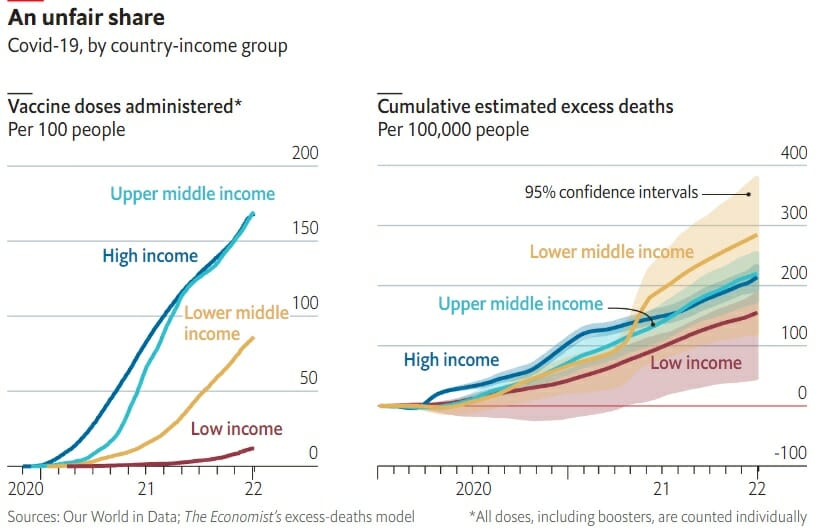Updated Jan.6, 2022, with the latest data of Covid caseload in Europe. As 2022 takes off and people are still rushing to get their booster shot or the first vaccination, the whole world appears to be awash in a new wave of the pandemic, with the evocative name of Omicron. And a new variant is now reported by the media, called IHU (and sometimes Cameron), first detected in the south of France. Should we worry? Should we expect yet another new wave of the virus to overwhelm us after Omicron? Will this ever end?
After all, the latest news – that the US once again heads the world in a record number of cases, over one million a day – is not reassuring.
Cases numbers are shooting up everywhere and especially in Europe where over one million people tested positive on January 5, 2022:
 But – and could this be a silver lining? – hospitalizations are not rising at the same pace. And that’s the big difference with previous waves of the pandemic.
But – and could this be a silver lining? – hospitalizations are not rising at the same pace. And that’s the big difference with previous waves of the pandemic.
So the news is not all that bad. There is no question that Omicron is highly contagious but it appears to provoke a less severe form of the disease, with fewer people in ICUs. In this new wave of the pandemic, most of the people seriously affected by the virus are the unvaccinated and those who have never been infected with the virus. But there is still a problem: With such a high number of sick, hospitals inevitably will start filling up. So the goal is to avoid a crash in the public health system.
As every country is either considering or imposing new restrictions against Omicron, ranging from full lockdown to mandatory mask-wearing including outdoors, South Africa where Omicron was most widespread (though it is not the country where it started – that was, possibly, the Netherlands) is the exception: It has just announced the end of the omicron-emergency and started lifting restrictions.
However new restrictions may not be as severe as those we all faced in the first wave of the pandemic. Covid rules in the face of Omicron, judged to be more contagious but less lethal than Delta, the previous mutation, were relaxed in a raft of other countries, starting with the U.S. that reduced the self-isolation requirement from 10 to 5 days. As I write, Belgium has become the latest country to relax its isolation rules as the country battles Omicron. Fully vaccinated people will no longer have to self-isolate if they come into close contact with someone infected with COVID-19, while the quarantine period for vaccinated people with the virus has been reduced from 10 to seven days.
Does that signal that the pandemic could be ending, slowly drifting into an endemic disease that we can all live with, the way we’ve lived with influenza since the notorious 1919-20 Spanish Flu?
What about IHU variant?
Let’s take things in order. First, how serious is the IHU threat? To begin with, it’s not a new threat, IHU existed before Omicron and the media simply did not report it, as noted by a German epidemiologist Marcel Salathé in an interview with DW.
In medical jargon, the IHU variant is labeled B.1.640.2 and was first discovered at the institute IHU Mediterranee Infection – hence the IHU name. Researchers believe that it contains 46 mutations – that’s less than Omicron that has about 50 mutations.
But what matters is where the mutations occur: What makes Omicron so contagious is that the mutations have affected the spikes of the virus (the famous “crown” of the coronavirus), increasing its ability to invade a cell.
So far the IHU variant was overwhelmed by the Delta variant – and Delta is the one that was overtaken by Omicron. So the likelihood that IHU will overtake Omicron is slight, but of course, experts will need to keep an eye on it.
Where do Covid Variants like Omicron come from?
There’s a consensus among experts that mutations tend to arise among the unvaccinated where the virus travels unimpeded as people have not developed any immunity against it. The probability for mutation rises every time the virus jumps from one person to the next – hence, potential pools for mutated forms of Covid are to be found among the vast numbers of no-vaxxers in the developed world, mostly Europe and America, and the people who could not be vaccinated in the developing world because not enough vaccines were made available.
Experts are unanimous that vaccination is key to stopping the virus from both spreading and mutating. William Schaffner, professor of preventive medicine at Vanderbilt University’s Medical Center has been crystal clear on the point ever since the start of the pandemic. In an interview on January 10, 2021 he memorably said this:
We have learned so much about his virus, that nowadays we are so much more effective in treating patients than we were back in March and April [2020, in the first wave of the pandemic] In addition, we now have several drugs, Remdesivir, Dexamethasone, that can be used as treatment. We are learning more about convalescent plasma and monoclonal antibodies. The research used in the therapeutic area – we are doing much better if you get sick. But if too many people come in, we are going to have a hard time treating all of those sick people to the best we can.
That was said exactly a year ago but it sums up the current situation very well: The real danger is to find our hospitals overwhelmed and the economic system slowed down as breaks occur in supply chains.
Some political leaders have reacted strongly to the public health threat posed by the unvaccinated: French President Macron has caused a stir, going so far as to say in an interview published late Tuesday in Le Parisien that “The unvaccinated, I really want to piss them off. And so, we’re going to continue doing so, until the end. That’s the strategy.”
The comment was made as his government is attempting to push through legislation that would make “green passes” for entering various venues dependent on vaccination rather than a negative COVID test. Opposition politicians immediately jumped on the comment and delayed the legislation for a second time in parliament demanding an explanation.
What about low-income countries?
The developing world still hasn’t received enough vaccine doses to immunize its population. The Economist, using its excess-deaths model to estimate how many people died from Covid, has produced a clear graph which shows, in relation to a country’s income level, the extent of mortality caused by the pandemic:
 As expected, lower-middle-income countries did very poorly, suffering from a clear lack of vaccination. The surprise is that some populations in low-income countries – at the bottom of the income ladder, meaning mostly in sub-Saharan Africa – have fared better than even those in high and upper-middle-income countries. The Economist’s conclusion is worth quoting in full:
As expected, lower-middle-income countries did very poorly, suffering from a clear lack of vaccination. The surprise is that some populations in low-income countries – at the bottom of the income ladder, meaning mostly in sub-Saharan Africa – have fared better than even those in high and upper-middle-income countries. The Economist’s conclusion is worth quoting in full:
…the disease has probably caused fewer deaths in sub-Saharan Africa, which has a median age of less than 20, than in older places such as Europe, which has a median age of 43 and where the prevalence of conditions such as obesity and diabetes put individuals at higher risk. And there is evidence that previous infections with malaria, which is common in much of sub-Saharan Africa, may lessen the severity of a subsequent covid infection. That is some good news for people there who are still unable or unwilling to be vaccinated.
So yes, overall, this might be good news though it should not be a reason to slow down the effort at vaccinating the whole world – because, put simply, vaccination is still the best way to stop the virus and force the pandemic to become a simple endemic disease.
I can’t wait for Covid to become “just” endemic. How about you?
Editors Note: The opinions expressed here by Impakter.com columnists are their own, not those of Impakter.com
Cover Photo by Jernej Furman










